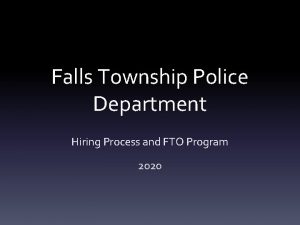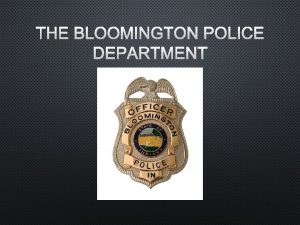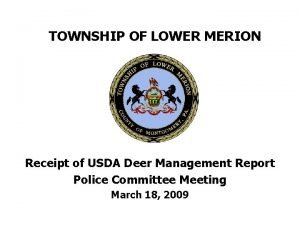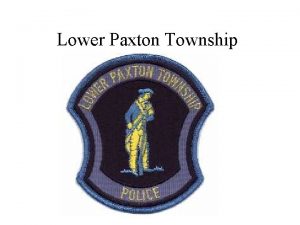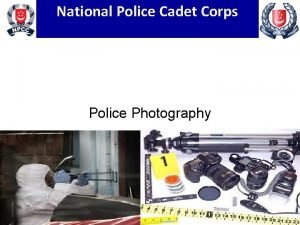TOWNSHIP OF LOWER MERION POLICE DEPARTMENT MVR History












- Slides: 12

TOWNSHIP OF LOWER MERION POLICE DEPARTMENT MVR History, Policy and Practice POLICE AND MINORITY RELATIONS COMMITTEE NOVEMBER 2019

What is an MVR? Mobile Video Recorder: System utilized by police to recordvideo & audio. • More traditionally, these have been “dash cameras” or In-Car Cameras (ICCs). • In the last decade or so, Body-Worn Cameras (BWCs) have become available and are growing in popularity.

LMPD’s History • LMPD marked fleet has been equipped with ICCs for 20 + years. • Because ICCs also recorded audio, the use of the units was originally restricted by the PA Wiretap Law. Officers could record the performance of their duties, but: • Officers were required by law to inform a subject that audio was being recorded and get permission to record. • Officers could not record audio in a residence. • ICCs - all traffic & pedestrian stops were recorded. Most of our field work could be recorded with the use of ICCs and the audio recorder which was worn by the officer. • Began discussing BWCs 4 years ago at CIP and Police Committee Meetings.

Modern Day Call for BWCs • High profile incidents, such as Ferguson (2014), led to demands for greater police transparency and accountability. • Many departments debated (costs, storage, public access, ? ) but pursued BWCs. • LMPD and many PA police departments paused and studied the units more in-depth. Why? 1. Many of the agencies acquiring BWCs were departments that had no MVR system at all. LMPD did have ICCs which recorded most of what we did in the field. 2. PA’s Wiretap Law restrictions negated much of the added mobility benefit of the BWCs. 3. PA lawmakers were considering changes to state law. While everyone wanted more accountability and transparency, citizens still valued their privacy. Would PA broaden our abilities to use MVR systems? 4. As this was occurring, technology was evolving. Most MVR vendors were developing advance systems which would synchronize ICCs and BWCs - It was wise to wait!

PA Law Changes 2017 • In response to public demands for BWCs, PA changed its law. • MVR recording, by readily identifiable police performing their duties, was no longer covered under the Wiretap Law. • Police could now record in most situations where they are called for service. • Police no longer required to inform people they were being recorded. • Public access to MVR recordings was also restricted. • MVR recordings were no longer covered under the Open Records Law. While requests are still fielded by the Open Records Officer, a separate law governs and restricts public access to MVR recordings. • Why? So your neighbors, the media, or You. Tubers can’t just get recordings of you. This is to protect citizens’ privacy and prevent open ended, blanket requests for police videos for commercial or other general uses (occurring around the country).

PA Law Changes 2017 (cont. ) • If a video is released, recordings can also be redacted. This would include blocking faces and muting or cropping segments of uninvolved people. • Since the law change, LMPD has only had a few public requests. • Defendants always have full access to recordings through discovery. • Additionally, for over 20 years, LMPD has been open and accommodating by inviting citizens who have made complaints to view MVR recordings.

LMPD BWC Implementation • Once state law changed, our existing MVR policy was reviewed and updated for our ICCs. The substantive changes were reviewed by our liability insurance carrier’s legal department. • In 2018, we began transitioning to a new vendor. Advanced ICC units and a new software system were acquired. • A few BWC units were acquired for field testing. • We began drafting & updated MVR policy which would expand required use of the BWCs. A protocol and sample policy distributed by the District Attorney’s Office and other agencies’ policies were evaluated and incorporated into the policy. • Incorporated Accreditation Agency Standards and Best Practices standards. • Early in 2019, began widespread deployment of BWC units, and the updated policy was finalized. At this time, all uniformed officers conducting field operations are equipped with a BWC.

LMPD BWC Use / Policy • The required MVR use in the updated policy is primarily focused on balancing: 1) the citizens’ desire for privacy, & 2) the public’s demand for transparency and accountability. • The policy was crafted to require MVR use on incidents which are more likely to fall under public scrutiny, e. g. criminal and traffic investigations, disturbances, other volatile situations. • Discretion is permitted when interviewing witnesses & victims. • Special consideration is given to investigations conducted in residences and other places where there is a heightened expectation of privacy. Won’t record in your house on a routine ambulance call or when taking a miscellaneous report from you. • Although no longer required by law, policy still requires officers to inform persons that they are being recorded. This is done to be transparent, and the practice usually de-escalates tense situations. • All officers receive training on the policy and the technical use of the MVR units. The MVR policy is publicly available and posted on our website! https: //www. lowermerion. org/services/police-department-policy-manual

Internal Access and Oversight • Officers have access to their own recordings for official use. Detectives have access to all videos but restricted to official investigative purposes only. • Management reserves the right to restrict access to any video depending on the nature of the incident or complaint. • Supervisors and administration have access to all recordings for oversight. • Supervisors systematically review random videos for compliance to policy. • Any significant incident, use of force, arrest, personnel complaint, are reviewed by supervisory staff.

Internal Access and Oversight (cont. ) • Can an officer review their video prior to giving a statement or preparing a report for a serious use of force incident such as a shooting? What’s the best practice? Depends on who you ask. • Proponents say yes - memories get distorted, & the camera doesn’t always reveal every aspect angle – what the officer perceived. • Opponents say no - you’re prompting & assisting memory or allowing officers to craft their statements to the video. • Yet many say both! Get an initial statement which is purely the officer’s perspective. Then, let them view the video. Discrepancies might not have been perceived or perhaps there’s an explanation. • Ultimately, federal law still requires that an officer’s actions be objectively reasonable based on what was “perceived” at the time. The officer does not see everything the camera does - the camera does not record all the officer perceives. • Officer access will likely be a case by case determination, and the DA’s Office will have the ultimate say.

Retention and storage • All recordings are kept for a minimum of 60 days pursuant to state law. • Recordings which are evidentiary, requested by the public, are subject to ongoing proceedings, or have training value are tagged and stored subject to other policies (evidence procedures, etc. ) • All other recordings are purged. • Recordings are currently stored on an internal server with off-site / cloud back up. • Specific, technical storage requirements are set by the PA State Police. MVR recordings are treated as sensitive law enforcement data and are subject to the security requirements of the federal Criminal Justice Information Services (CJIS).

In Conclusion • BWCs have been well received by our officers. • The additional video provided by BWCs has already proved valuable in many instances. • Ultimately, the MVR recordings allow for better supervision, training, officer development, and they increase public confidence with increased transparency and accountability.
 Vancleave upper elementary school
Vancleave upper elementary school Viking channel umasd
Viking channel umasd Upper merion elementary school
Upper merion elementary school Police defensive tactics
Police defensive tactics Tvr operation
Tvr operation Fmcsa psp report
Fmcsa psp report Resternotomia
Resternotomia What is mvr in physics
What is mvr in physics Olmsted falls building department
Olmsted falls building department Bloomington indiana police department
Bloomington indiana police department New canaan police department
New canaan police department Lathrup village police department
Lathrup village police department Huntersville police report
Huntersville police report



